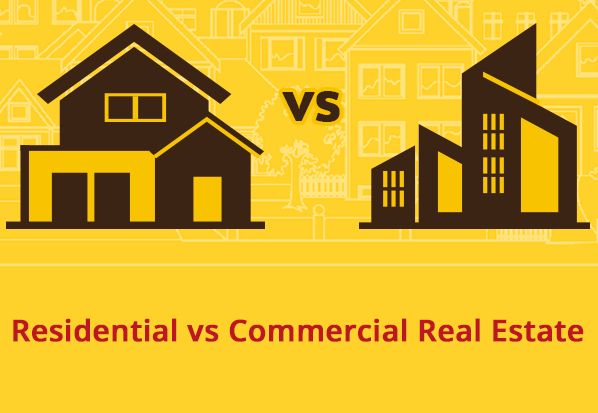Join Our Social Community
Social Connection
Which is a Better Investment Option – Residential or Commercial Real Estate?
Undoubtedly, an investment, whether in commercial real estate or residential properties is a great way to grow your money rapidly. It takes time to learn the ins and outs of both the commercial and residential real estate investments as they are very different from each other. Some prefer investing in the Commercial real estate as the best, while for others, residential real estate is a great investment. It is hard to determine which is the best, but it greatly depends on the purpose of the investor, the risk involved and the return.

Before delving into each of their pros and cons, first understand what actually are commercial and residential real estates.
Commercial Real Estate:
includes buildings solely for business purpose like office buildings, warehouses, retail buildings, industrial buildings, business complexes. It involves property that is sold or leased to achieve a predetermined business objective. Investors invests here to achieve an anticipated rate of return on their investments.
Residential Real Estate:
includes Apartment buildings, housing complexes, individual houses, Co-operative units, etc. It usually revolves around satisfying the needs of homeowners and their families or to become landlords & house flippers.
Many people believe in investing in residential real estate because they feel more comfortable with buying homes, but commercial real estate can also be a great way to balance your selection. Confused??
Below are the differences between the commercial real estate and residential real estate investments:
#1 Rental Returns
Obviously, the main reason behind making investments is to achieve high return. Residential and commercial real estate investments vary greatly in terms of returns. Commercial property offers higher rental returns than the residential real estate investments.
Investors can typically expect a high return, anywhere between 8 to 10% if they invest in commercial property, whereas the return in a residential property will be between 2 and 4%.
#2 Risks
The High returns come with a price-the risk!! Commercial Property has a higher return, but this comes at a higher risk, whereas there is low risk in residential property investments. In residential property, a property might remain vacant for a week or two before a new tenant is found. The major risk in commercial property is a high vacancy rate. It may take months or even years before you start getting rent from your next tenant.
#3 Comfort Zone
People feel comfortable with investing in residential property because they are familiar with it and they understand the prices. Also, they understand the leasing process from the perspective of a tenant as they might have, at some stage, rented a property. The residential prices are stable too.
Whereas, with the Commercial property prices, they rise and fall due to external influences, which makes it difficult for people to understand the commercial leasing process.
#4 Initial Funding
Acquiring a commercial property typically requires more capital upfront (a minimum of 30 per cent) than acquiring a residential rental in the same area. And even after acquiring a commercial property, you can still expect some large capital expenditures to follow. Whereas, in residential property investment, about 80 to 100% of the purchase price can be borrowed depending on the history of the income and credit of an individual.
#5 Outgoings
A great advantage of being an owner of commercial property is that the tenant usually is responsible to pay most of the outgoings, such as insurance, repairs, maintenance and council rates. Whereas with residential property, the owner uses the rent money to pay for rates, taxes, maintenance, etc.
While it is impossible to have one choice that fits everyone’s requirements, it is important to weigh the pros and cons of both the options before reaching to a conclusion. Settle for the one that justifies your purpose in the best way!!







